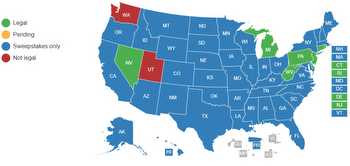What has led to the growth in online gambling in Ireland?

Online gambling has been growing rapidly in Ireland in recent years, with a wide range of options available to players across the country. This growth can be attributed to a number of factors, including advancements in technology, the popularity of gambling in Ireland, and the rise of online casinos and sportsbooks. In this essay, we will explore these factors and discuss their impact on the growth of online gambling in Ireland.
One of the main drivers of the growth of online gambling in Ireland is the number of worldwide options available to players. With the rise of online casinos and sportsbooks, players in Ireland now have access to a wide range of casino gaming options, including traditional casino games such as blackjack, roulette, and slots, as well as sports betting, poker, and other forms of online gambling. These options are not limited to Irish-based operators but include operators from around the world.
Access to online sites
One of the key reasons for this global availability is the fact that online gambling is legal in many countries, including the UK and Malta, which are home to many of the world’s largest online gaming operators. This means that Irish players can access online casinos and sportsbooks that are licensed and regulated in these jurisdictions, providing them with a safe and secure gaming experience. The availability of these options has helped to drive the growth of online gambling in Ireland, as players are no longer limited to local operators.
Another factor contributing to the growth of online gambling in Ireland is the popularity of gambling in the country. According to a study conducted by the Department of Health in 2019, over half of Irish adults had participated in some form of gambling activity in the previous year. This includes not only traditional forms of gambling such as the National Lottery and horse racing but also online gambling.
The study also found that online gambling was particularly popular among younger age groups, with over 60% of those aged 18-24 reporting that they had gambled online in the previous year. This is likely due in part to the fact that younger generations are more tech-savvy and comfortable with using digital platforms, including online casinos and sportsbooks. As such, the popularity of gambling in Ireland, combined with the availability of online options, has helped to fuel the growth of online gambling in the country.
The popularity of online gambling in Ireland can also be seen in the revenue generated by the industry. According to a report by the Irish Independent, the online gambling sector in Ireland was worth €1.4 billion in 2019, up from €1.1 billion in 2018. This represents a significant increase in revenue over a relatively short period of time and highlights the growing importance of online gambling to the Irish economy.
In addition to the popularity of gambling in Ireland, advancements in technology have also played a role in the growth of online gambling in the country. With the rise of smartphones and tablets, players can now access online casinos and sportsbooks from anywhere, at any time. This has made online gambling more convenient and accessible than ever before and has helped to attract new players to the industry.
Furthermore, advancements in technology have also led to the development of new and innovative gaming options, such as virtual reality casinos and live dealer games. These options provide players with a more immersive and engaging gaming experience, which has helped to attract a wider audience to online gambling.
However, the growth of online gambling in Ireland has not been without its challenges. One of the main concerns is the potential for problem gambling, which can have serious social and economic consequences. According to the Health Service Executive (HSE), around 40,000 people in Ireland are affected by problem gambling, with many of these individuals turning to online gambling as a way to cope with their addiction.
New bill
To address this issue, the Irish government has introduced a number of measures to promote responsible gambling and protect vulnerable players. For example, the government has established a national gambling regulator, the Irish Gambling Control Bill, which will introduce new regulations and protections for players. The regulator will oversee the licensing and regulation of all gambling activities in Ireland, including online gambling, and will have the power to impose fines and revoke licenses for operators who fail to comply with the regulations.
In addition, the government has also introduced a number of initiatives aimed at promoting responsible gambling and providing support for those affected by problem gambling. For example, the HSE offers a range of services for problem gamblers, including counselling and support groups, while a number of charities and organizations have also been established to provide assistance to those struggling with addiction.
Another potential challenge for the growth of online gambling in Ireland is the issue of taxation. While the industry is a significant contributor to the Irish economy, with a high volume of transactions taking place online, there have been concerns that operators may be exploiting loopholes in the tax system.
To address this issue, the Irish government introduced a new tax on online gambling in 2019. Under the new system, operators are required to pay a 2% tax on their gross gaming revenue in Ireland, regardless of where they are based. This has helped to level the playing field for Irish-based operators and provide a fairer system of taxation for the industry.
The growth of online gambling in Ireland can be attributed to a number of factors, including the global availability of gaming options, the popularity of gambling in Ireland, and advancements in technology. While the industry has brought significant economic benefits to the country, there are also concerns around problem gambling and taxation. The introduction of new regulations and initiatives aimed at promoting responsible gambling and protecting vulnerable players will be crucial in ensuring that the industry continues to grow in a safe and sustainable manner.



































